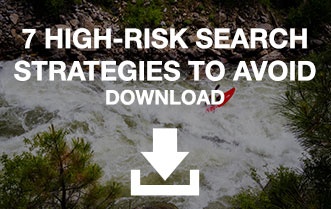I was traveling on business recently and spent some time down in New Orleans. It was the first time I'd been there after Hurricane Katrina. My hosts were fellow entrepreneurs, also part of EO and on the board of the local chapter there. They put together a private tour of New Orleans, with a focus on the issues that led to the spectacular and tragic failure of so many systems post-Katrina. As one of my hosts put it, it was a breakdown of three things -- vision, leadership and communication. The more we drove around New Orleans and the more I saw of the devastation, the more I heard of how these entrepreneurs responded to it. I got this strange feeling of metaphoric déjà vu. And then it dawned on me. Katrina is a parallel for the current economic crisis America finds itself in-- a sudden, unpredicted disaster for which none of us were prepared. So I asked Jude Olinger, the current EO New Orleans Chapter President and CEO of market research firm the Olinger Group, if he had any "lessons learned" that he felt might apply to any unpredictable, catastrophic disaster. His response? Oh yeah. In fact, Jude had sat down several months after Katrina, and tried to capture the lessons learned. He emailed them to me after our meeting. And what I saw was an eerie parallel in the lessons Jude learned surviving and succeeding post-Katrina to what each of us--entrepreneur, business person, head of household, individual--could also adopt as survival strategies in one of the biggest financial hurricanes ever to hit the U.S. in modern times, perhaps the globe. As much as entrepreneurs drive the economy, and no doubt recovery, we all should think of heeding these lessons. In reflecting on the below, I saw them universally applicable to all current innovation sectors in which we as an executive search firm have practice areas, whether cleantech / energy, medical devices, software, biotech, distance learning / education, Internet Web 2.0, mobility / wireless. In chatting with CEOs in each of these sectors to test my assumption, they too felt these were "universal truths."
Below is a partial list of Jude's lessons learned, selected for those that carry strong correlation both to a natural disaster such as Katrina as well as an economic disaster. Following it is some interesting Q&A in dialoging with him about the experience. And to learn more about Jude Olinger's firm, visit his website.
After crisis strikes...
Lesson #1 - Don't panic but act quickly. Stay focused on the tasks that you have to accomplish to recover. Prioritize tasks and act upon them immediately. Time, or rather lack of time, is your enemy. Everyone is going to want your time... so have to prioritize and think ahead. Anticipate things that might happen and prepare for them. If you know you have to lay people off, and it's a reality, then do it.
Lesson #2 - [In knowledge worker industries] Don't lose your greatest asset - your employees. Be decisive. Communicate with employees quickly and frequently. Be a leader and let them know the plans and intentions of the company and how they fit in. Evaluate what you can do for them immediately and provide as much assistance as possible. Don't lose the key people that make you successful every day
Lesson #3 - Communicate with your clients and vendors quickly. Let them know that you are still in business and intend to fulfill your obligations. There often is client empathy and understanding for about a week. Then clients start to look to mitigate their risk by moving business-all or at least part of it-to another provider just to reduce their risk. Keep them from defecting. IF they don't hear from you, then they'll assume that risk is real in continuing to work with your firm..
Lesson #4 - Locate your advisors (accountant, insurance agent, banker, attorney) quickly and leverage their knowledge/expertise in the recovery. These relationships should become PERSONAL... you need to know your banker's wife, husband, and children.... For accountant/bankers, questions like: "Should I do a 25% paycut?" (accountant/CPA), or "Will banks offer any forebearance in the interim?"
Lesson #5 - Be selfish with your time - everyone will want it, and you won't have enough of it to go around. Tend to your personal relationships and yourself. Crisis will test you mentally, physically, and emotionally and you will need all of your strength and energy to survive it.
Lesson #6 - Get the facts - not things reported as fact by the media - before making any major life or business decisions. Lots of false rumors will abound. Filter information carefully. Be as close to the information as possible - the further you are away from it, the less accurate it is.
Lesson #7 - Don't consume too much media. It will discourage you and take away from your focus. Expect lots of inaccuracies in the news - see Lesson #8.
Lesson #8 - CASH is KING - even more so in a crisis. Build up cash reserves. Manage cash flow very wisely. Be prepared for a 3 to 6 months cash flow crunch and figure out how to survive it.
Lesson #9 - Don't count on ANY government assistance (FEMA assistance, SBA loans, or other federal/state assistance). By the time you get it, if you get it, it may already be too late.
Lesson #10 - Keep a positive attitude - no matter how bad your situation - or you are done. It's the one thing that you have total control over and is critical for you to persevere.
Lesson #11 - Don't expect things to be what they were before. They won't be the same. Adapt, adjust, and keep moving. It will never be "what it was before." And don't expect it to be.
Times of crisis test us in ways that we can never imagine. It's these times that makes us stronger and more determined. Don't let ANYTHING, not even a catastrophe, get in the way of reaching your goals and achieving success.
In further discussing the lessons Jude took away from the Katrina experience as an entrepreneur/business owner, here are some of Jude's sentiments some three years out from ground zero:
Q: How are you entrepreneurs in New Orleans different after than before?
A: We're smarter. We had a chance to start from scratch, and can be anything we wanted to be (operationally). When you lose everything, you have an opportunity to start all over again, and you can do it better the second time you build the house versus the first. All of us have gotten smarter about who we want as clients, focusing on more profitable clients that fit the core value proposition of the company, versus taking on all comers.
Q: Has it permanently changed, or only temporarily changed your prioritization of work, family, and personal?
A: Jude said that one word was crucial on keeping balance.... "perspective." It's all about perspective, keep proper perspective, and realizing that not everything may be as bad as you might think it is. Put all things in perspective. Events like Katrina [or the current economic crisis] create incredible stress. Perspective is critical to subdue this stress.
Q: And "that which doesn't kill you makes you stronger"?
A: True. But it's an unfinished sentence. The end of the sentence is "but leaves deep scars." Think about PTSS (Post-Traumatic Stress Syndrome... Vietnam/Iraq...) Your life is turned upside down, you spend 3 years re-building it, and you always will fear that something will happen again. "I cry a lot more. Am much more empathetic... in a good way. I believe the Katrina experience has allowed me to can connect to people better than before."





